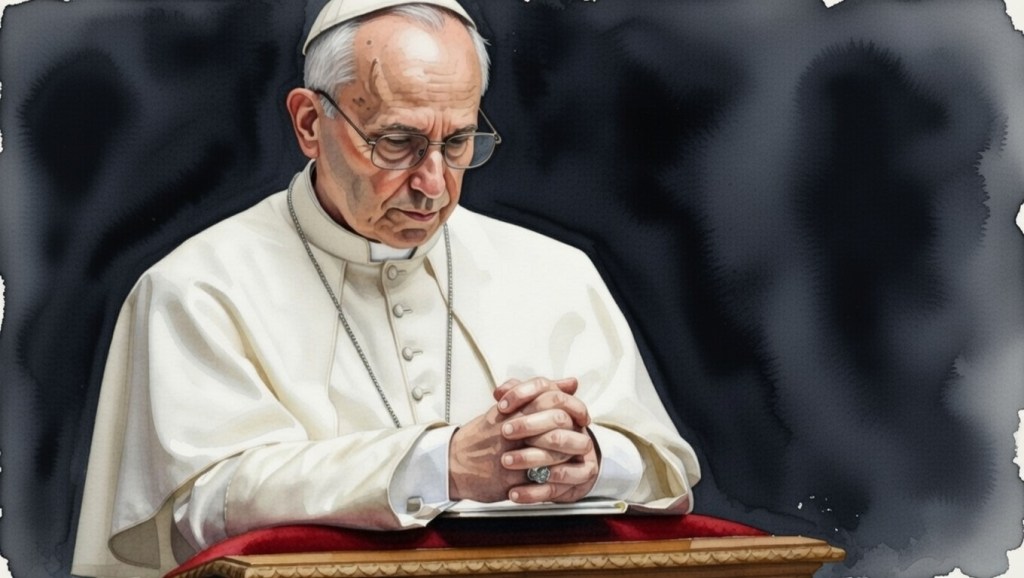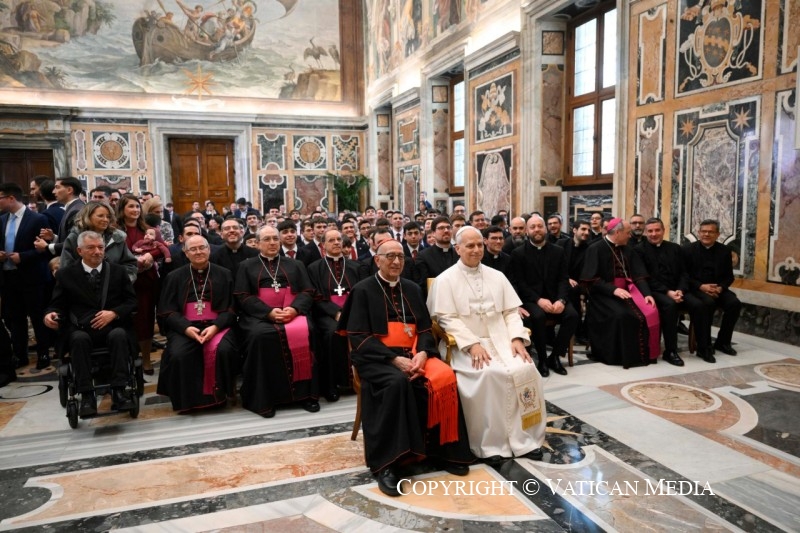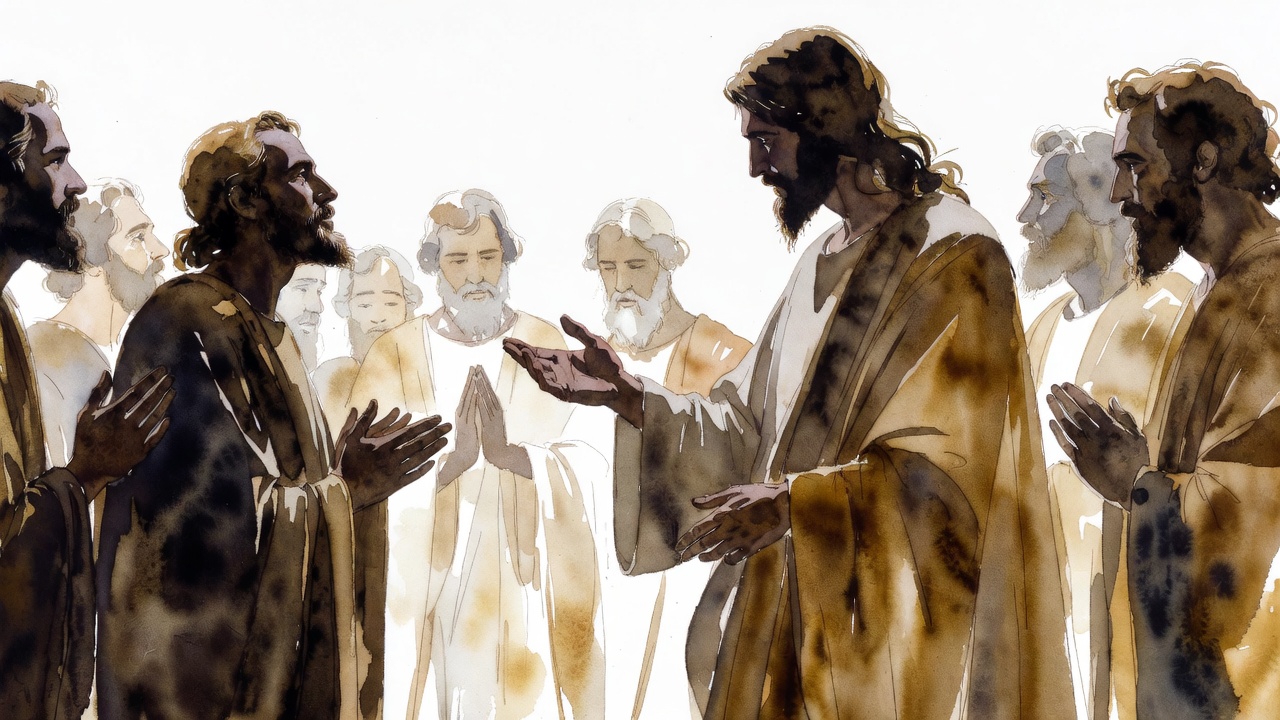“A shared dream: reclaiming the Mediterranean as a laboratory of peace”
Pope appeals to humanity at General Audience

This morning’s General Audience was held at 9:00 a.m. in St. Peter’s Square.
In his address in Italian, the Pope focused his meditation on his recent Apostolic Journey to Marseilles on the occasion of the “Rencontres Méditerranéennes”.
After summarising his catechesis in the different languages, the Holy Father addressed special expressions of greeting to the faithful present.
The General Audience ended with the recitation of the Pater Noster and the Apostolic Blessing.
_______________________________________
The Apostolic Journey to Marseille for the “Rencontres Méditerranéennes”
Dear brothers and sisters!
I went to Marseille at the end of last week to participate in the conclusion of the Rencontres Méditerranéennes (Mediterranean Meetings), which involved Bishops and mayors from the Mediterranean area, along with numerous young people, so that their outlook would be open to the future. In fact, the event that took place in Marseille was called “Mosaic of Hope”. This is the dream, this is the challenge: that the Mediterranean might recover its vocation, that of being a laboratory of civilization and peace.
As we know, the Mediterranean is the cradle of civilization and a cradle is for life! It is not tolerable that it become a tomb, neither should it be a place of conflict. The Mediterranean Sea is the complete opposite of the clash between civilizations, war, human trafficking. It is the exact opposite because the Mediterranean is a means of communication between Africa, Asia, and Europe; between the north and the south, the east and the west, persons and cultures, peoples and tongues, philosophies and religions. Of course, the sea is always an abyss to overcome in some way, and it can even become dangerous. But its waters safeguard treasures of life; its waves and its winds carry vessels of all types.
From its eastern shore, two thousand years ago, the Gospel of Jesus Christ departed. Of course, this [the proclamation of the Gospel] does not happen magically, neither is it accomplished once and for all. It is the fruit of a journey in which each generation is called to travel a piece, reading the signs of the times in which it lives.
The meeting in Marseille comes after similar meetings that took place in Bari in 2020, and in Florence last year. It was not an isolated event, but a step forward on the itinerary that began with the “Mediterranean Colloquia” organized by Giorgio La Pira, the Mayor of Florence, at the end of the 1950s. It is a step forward to respond today to the appeal launched by Saint Paul VI in his Encyclical Populorum progressio, to promote “a more humane world community, where all can give and receive, and where the progress of some is not bought at the expense of others.” (n. 44).
What came out of the Marseille event? What came out is an outlook on the Mediterranean that I would call simply human, not ideological, not strategic, not politically correct nor instrumental; no, human, that is, capable of referring everything to the primary value of the human person and his or her inviolable dignity. Then, at the same time, a hopeful outlook came out. Today, this is surprising– when you hear testimonies from those who have lived through inhuman situations, or who have shared them, and they themselves give you a “profession of hope”. And also a fraternal outlook.
Brothers and sisters, this hope, this fraternity must not “evaporate”; no, rather, it needs to be organized, concretized through long, medium and short-term actions so that people, in complete dignity, can choose to emigrate or not to emigrate. The Mediterranean must be a message of hope.
But there is another complementary aspect: hope needs to be restored to our European societies, especially to the new generations. In fact, how can we welcome others if we ourselves do not first have a horizon open to the future? How can young people, who are poor in hope, closed in on their private lives, worried about managing their own precariousness, open themselves to meeting others and to sharing? Our societies, many times sickened by individualism, by consumerism and by empty escapism, need to open themselves, their souls and spirits need to be oxygenized, and then they will be able to read the crisis as an opportunity and deal with it positively.
Europe needs to retrieve passion and enthusiasm. And I can say that I found passion and enthusiasm in Marseille: in its Pastor, Cardinal Aveline; in the priests and consecrated persons; in the faithful laity dedicated to charity, to education; in the People of God who showed great warmth during the Mass in the Vélodrome Stadium, I thank all of them and the President of the Republic, whose presence testified that all of France was paying attention to the event in Marseille. May Our Lady, whom the people of Marseille venerate as Notre Dame de la Garde, accompany the journey of the peoples of the Mediterranean so that this region might become what it has always been called to be – a mosaic of civilization and hope.
__________________________________________
 Special Greetings
Special Greetings
I extend a warm welcome to the English-speaking pilgrims and visitors taking part in today’s Audience, especially the groups from Norway, The Netherlands, South Africa, India, Indonesia, the Philippines, Canada and the United States of America. My special greeting goes to the diaconate class of the Pontifical North American College, together with their families and friends. Upon all of you, I invoke the joy and peace of our Lord Jesus Christ. God bless you!
____________________________
Summary of the Holy Father’s words
Dear brothers and sisters: My recent visit to Marseille coincided with the conclusion of a significant Meeting of civil and religious leaders, and many young people, from the Mediterranean countries. The Meeting’s theme, “Mosaic of Hope”, alluded to the hope of freedom that inspires migrants to undertake dangerous journeys, but also Europe’s own need for renewed hope in its future. The Mediterranean region, which embraces three continents and a great variety of cultures, is called, especially at this time of forced migrations, to be a “workshop of civilization and peace” in the service of a more humane and fraternal world. The Meeting thus reaffirmed the importance of respect for both the right to emigrate and the right not to emigrate, and the urgent need, in light of present migration patterns, for adequate structures of security, welcome and integration. May young people in particular help to compose the “Mosaic of Hope” which is the present and future of the Mediterranean world, and likewise see that hope reflected in the faces of their brothers and sisters come from afar.
_______________________________________________________
Video message of the Pope at the General Audience
Related

Pope Leo XIV Calls for Dialogue Amid Escalating War in the Middle East
Exaudi Staff
03 March, 2026
2 min

Pope Leo XIV and the Profound Experience of the Lenten Spiritual Exercises
Exaudi Staff
01 March, 2026
2 min

Its revelation is a saving surprise! Does it still draw us in?
Exaudi Staff
01 March, 2026
6 min

“Man is not made to live closed in on himself, but in a living relationship with God”
Exaudi Staff
01 March, 2026
5 min
 (EN)
(EN)
 (ES)
(ES)
 (IT)
(IT)


